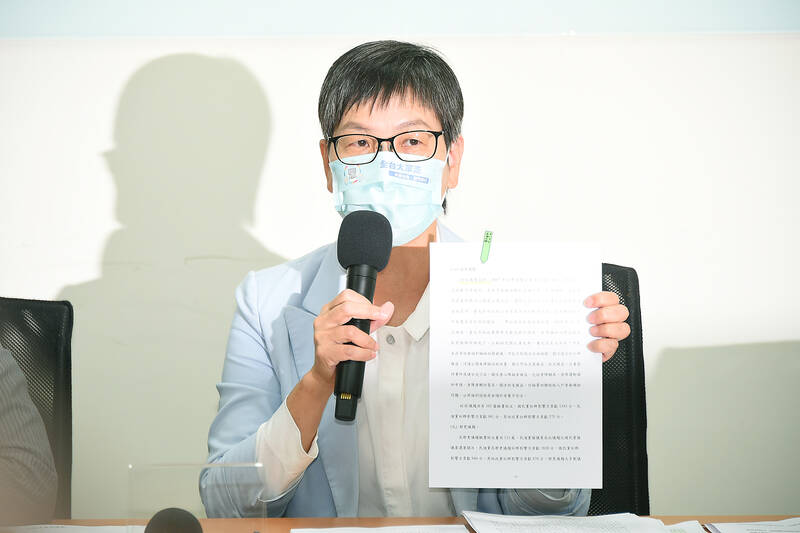Taiwan People’s Party (TPP) Legislator Tsai Pi-ru (蔡壁如) yesterday resigned after her alma mater found that her master’s thesis contained plagiarized sections.
Takming University of Science and Technology — where Tsai obtained a master’s degree in 2019 — on Thursday revoked the degree after a committee found she had plagiarized material for her thesis.
According to the TPP’s legislator-at-large nominee list from 2020, Shin Kong Life Insurance Co deputy chief executive Cynthia Wu (吳欣盈) is to replace Tsai.

Photo: Tu Chien-jung, Taipei Times
Earlier yesterday, Tsai denied the accusations, telling a news conference that the thesis was her own work.
She said she would wait for the full review report from the university, but was “willing to resign as legislator if flaws are found.”
“When I entered the master’s program it was not to make my educational background look better on paper, it was to fulfill work requirements, as I was new to public office,” she said. “I wanted to improve my understanding of how social media are used in politics, the types of things politicians post about and how social media affect results at the polls.”
Tsai’s thesis was about the attention given to municipal issues on social media, which required her to collect a large amount of data and to cite many sources, she said.
“If in that process I accidentally made omissions, I am willing to own up to my mistake,” she said. “I hope the committee will make its findings public so that they can serve as an example for improvement, for myself and others.”
PUBLIC ATTENTION
National Chengchi University professor Tsai Tseng-chia (蔡增家) said the case is expected to garner more public attention.
“The public is going to be watching this, so the review committee should publish its findings and let the public be part of the review process,” he said. “Otherwise, it will be impossible for anyone to have any substantive discussion on whether Tsai Pi-ru was at fault. The situation will only result in people attacking each other.”
Echoing similar comments from Tsai Pi-ru, Tsai Tseng-chia said making the committee’s findings public would help her make improvements to her academic writing and better equip her to defend herself against the allegations.
Tsai Pi-ru said she believes the parts of the thesis on daycare and the aging population was deemed problematic.
“[Takming] university said I had not included a source. I told them the source was a Facebook post by a city councilor, but as there is no way to search for specific posts on Facebook, I could not go back and make a proper citation,” she said.

Alain Robert, known as the "French Spider-Man," praised Alex Honnold as exceptionally well-prepared after the US climber completed a free solo ascent of Taipei 101 yesterday. Robert said Honnold's ascent of the 508m-tall skyscraper in just more than one-and-a-half hours without using safety ropes or equipment was a remarkable achievement. "This is my life," he said in an interview conducted in French, adding that he liked the feeling of being "on the edge of danger." The 63-year-old Frenchman climbed Taipei 101 using ropes in December 2004, taking about four hours to reach the top. On a one-to-10 scale of difficulty, Robert said Taipei 101

Nipah virus infection is to be officially listed as a category 5 notifiable infectious disease in Taiwan in March, while clinical treatment guidelines are being formulated, the Centers for Disease Control (CDC) said yesterday. With Nipah infections being reported in other countries and considering its relatively high fatality rate, the centers on Jan. 16 announced that it would be listed as a notifiable infectious disease to bolster the nation’s systematic early warning system and increase public awareness, the CDC said. Bangladesh reported four fatal cases last year in separate districts, with three linked to raw date palm sap consumption, CDC Epidemic Intelligence

Taiwanese and US defense groups are collaborating to introduce deployable, semi-autonomous manufacturing systems for drones and components in a boost to the nation’s supply chain resilience. Taiwan’s G-Tech Optroelectronics Corp subsidiary GTOC and the US’ Aerkomm Inc on Friday announced an agreement with fellow US-based Firestorm Lab to adopt the latter’s xCell, a technology featuring 3D printers fitted in 6.1m container units. The systems enable aerial platforms and parts to be produced in high volumes from dispersed nodes capable of rapid redeployment, to minimize the risk of enemy strikes and to meet field requirements, they said. Firestorm chief technology officer Ian Muceus said

MORE FALL: An investigation into one of Xi’s key cronies, part of a broader ‘anti-corruption’ drive, indicates that he might have a deep distrust in the military, an expert said China’s latest military purge underscores systemic risks in its shift from collective leadership to sole rule under Chinese President Xi Jinping (習近平), and could disrupt its chain of command and military capabilities, a national security official said yesterday. If decisionmaking within the Chinese Communist Party has become “irrational” under one-man rule, the Taiwan Strait and the regional situation must be approached with extreme caution, given unforeseen risks, they added. The anonymous official made the remarks as China’s Central Military Commission Vice Chairman Zhang Youxia (張又俠) and Joint Staff Department Chief of Staff Liu Zhenli (劉振立) were reportedly being investigated for suspected “serious